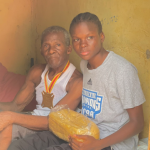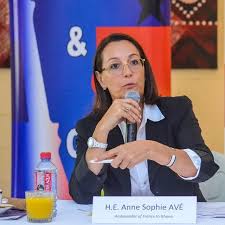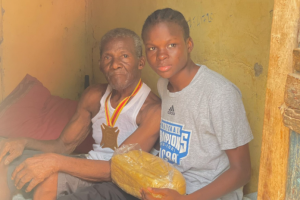former France Ambassador to Ghana, Anne-Sophie Avé, has called for Ghana to consider granting diplomatic passports to a select group of talented artists. This proposal specifically targets renowned musicians such as Sarkodie, Stonebwoy, Black Sherif, Shatta Wale, R2Bees, and King Promise, aiming to recognize and amplify their contributions to the country’s cultural landscape and international reputation.
Diplomatic passports are typically reserved for high-ranking government officials and diplomats, enabling them to travel internationally with greater ease and diplomatic privileges. However, Anne-Sophie Avé believes that extending this privilege to Ghanaian artists can yield significant benefits for the nation.
Ghanaian music, especially in the genres of hiplife, afrobeats, and dancehall, has gained international acclaim and popularity in recent years. Artists like Sarkodie, Stonebwoy, Black Sherif, Shatta Wale, R2Bees, and King Promise have played a crucial role in bringing Ghanaian music to a global stage and have become cultural ambassadors for the country. By granting them diplomatic passports, Avé argues that the artists can better represent Ghana on the international scene and promote its rich culture, heritage, and values.
One of the main advantages of diplomatic passports is the facilitation of visa processes. With a diplomatic passport, artists would be able to travel more freely, attend international concerts and festivals, and engage in collaborations with global musicians, fostering cultural exchanges and enhancing Ghana’s soft power abroad.
Additionally, diplomatic passports often grant access to diplomatic lounges and expedited airport clearance, which could significantly ease the travel burden for these busy artists, allowing them to focus more on their craft and international engagements.
Another aspect to consider is the potential economic impact. The growing popularity of Ghanaian music worldwide has led to an increase in tourism, with many fans traveling to Ghana to experience its vibrant music scene firsthand. By supporting artists with diplomatic passports, the Ghanaian government can demonstrate its commitment to nurturing and promoting its cultural ambassadors, further attracting tourists and investors interested in the country’s entertainment and creative industries.
However, critics argue that extending diplomatic passports to artists could raise concerns about misuse or abuse of diplomatic privileges. To address these concerns, appropriate regulations and guidelines would need to be established to ensure responsible use of diplomatic status.
It’s worth noting that this proposal, while innovative, would require thorough consideration and consultation with various stakeholders, including government officials, the artists themselves, and the general public. Nevertheless, Anne-Sophie Avé’s suggestion sparks an essential dialogue about recognizing and empowering artists for their significant contributions to Ghana’s global identity.
In conclusion, the call by former France Ambassador to Ghana, Anne-Sophie Avé, to grant diplomatic passports to artists like Sarkodie, Stonebwoy, Black Sherif, Shatta Wale, R2Bees, and King Promise is a compelling and forward-thinking proposition. If carefully implemented, this move could provide valuable opportunities for these musicians to represent Ghana on the world stage, promote cultural exchange, and further elevate Ghana’s reputation as a hub for musical talent and creativity.











Add Comment